When temperatures plummeted to -20F, the Spree Bridge Badeschiff became the coolest place in Berlin to escape the harsh winter. The fresh water of the Badeschiff now enables the city’s inhabitants to figuratively swim in their river, which itself is too polluted.
Badeschiff/ Winter bathing ship
Design Team: Susanne Lorenz and AMP Arquitectos, Gil Wilk Architekten, Thomas Freiwald
Location: Spree Bridge, Berlin, Germany
When to visit: Winter-Daily from 1 pm till approx.1 am / Summer-8 am– 12 pm
In 2002, various international architects and artists were invited to deal with bridges in the context of connecting elements in cities. Instead of creating a bridge over the Spree, the Badeschiff team proposed a bridge to the Spree. Following a tradition of public bathing in the river at the turn of the century, the project encouraged a closer connection between the city and its river by floating a pool on it.
Design Team: Susanne Lorenz and AMP Arquitectos, Gil Wilk Architekten, Thomas Freiwald
Location: Spree Bridge, Berlin, Germany
When to visit: Winter-Daily from 1 pm till approx.1 am / Summer-8 am– 12 pm
In 2002, various international architects and artists were invited to deal with bridges in the context of connecting elements in cities. Instead of creating a bridge over the Spree, the Badeschiff team proposed a bridge to the Spree. Following a tradition of public bathing in the river at the turn of the century, the project encouraged a closer connection between the city and its river by floating a pool on it.
A 30 year old barge was modified in a nearby dockyard. It was reduced to its shell and filled with preheated and chlorinated water to form a 32m long pool complemented with a wooden bridge and a sun terrace. All technical installations are concealed in the edge profile and yet allow an unobstructed view across the river when swimming.
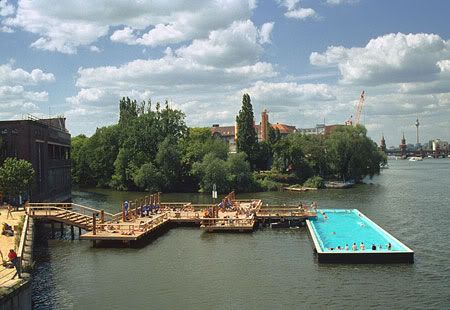
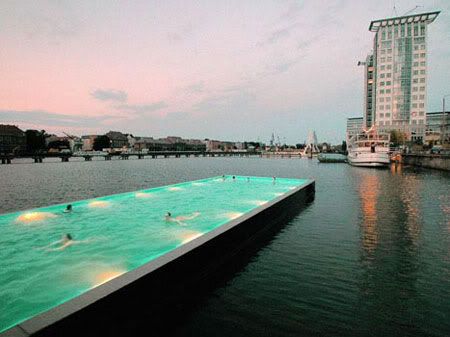
During the winter, a three-part membrane structure divides the three squares (bathing ship) and its jetty into three separate areas: a lounge, sauna and the pool ship itself. These areas are connected via additional boxes containing technical and service functions. A two-layered membrane is spanned over elliptical wooden trusses maintaining a combination of translucent and transparent surfaces.
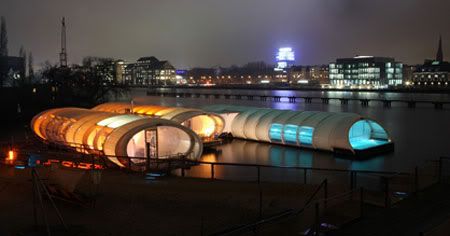

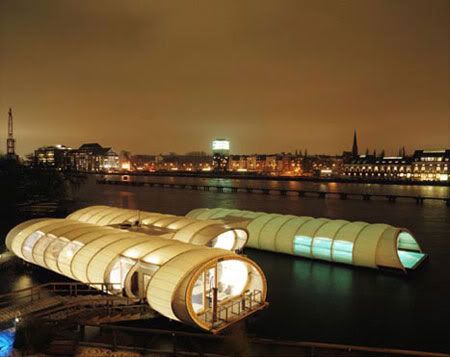
The space between the membranes is filled with air to optimise insulation and guarantee a comfortable interior temperature of 25°C even when it is extremely cold outside.The first square, nearest to the bank, changes into a white lounge with chaises as seating and a bar. The pool is the only element which stays unchanged,apart from the roof. The covering of all three areas allows in places the visitor to enjoy the view of the exposed location in the harbor.
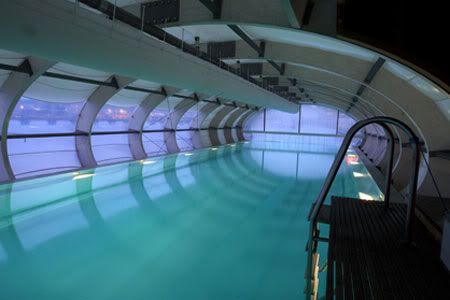
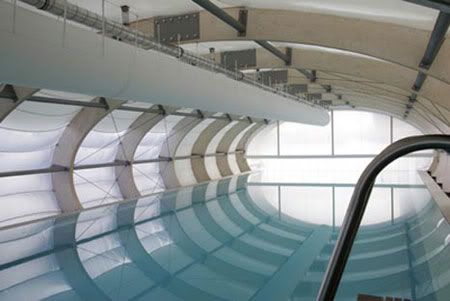
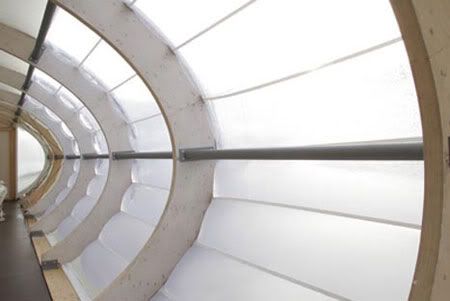
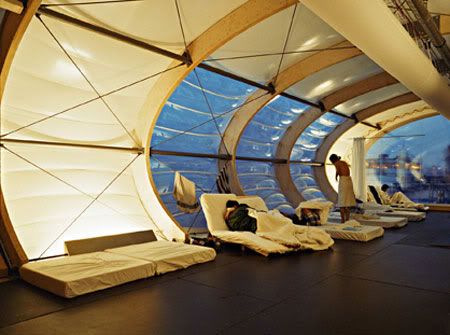
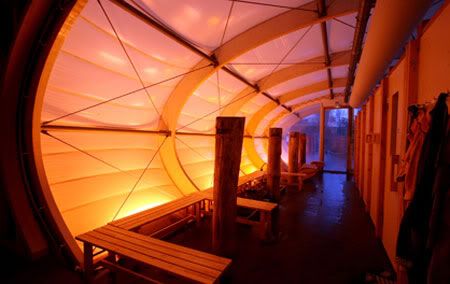
But the very best view awaits the brave, who dares to plunge into the pool and swim out into the unroofed water balcony. Simple joints, standard materials and easy manual assembly allow for the membrane structure to be dismantled and re erected without the use of a crane. These elements can then be stored during the summer or alternatively used as a pavilion on the shore.
The construction of a roof for the Badeschiff had to meet three challenges. First of all the static of bath ship originally wasn’t intended to carry a roof, so the construction had to be light in weight; secondly it had to be flexible, in order that it can be easily dismantled in the summer; and thirdly it had to correspond with the aesthetic idea of building a bridge, which connects the river with the urban dwellers.
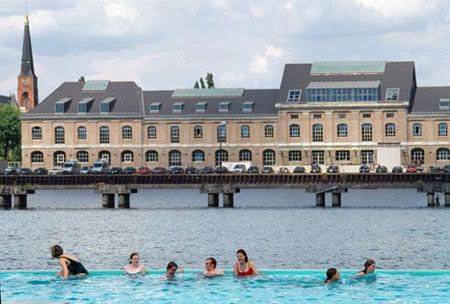

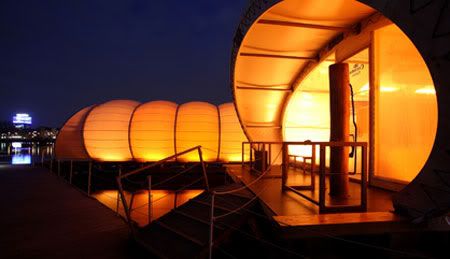
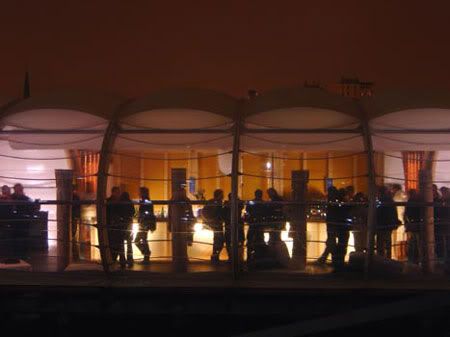
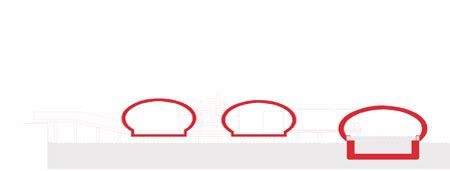
via AMP Arquitectos | Thomas Freiwald | Arena-Berlin | Architonic


During the winter, a three-part membrane structure divides the three squares (bathing ship) and its jetty into three separate areas: a lounge, sauna and the pool ship itself. These areas are connected via additional boxes containing technical and service functions. A two-layered membrane is spanned over elliptical wooden trusses maintaining a combination of translucent and transparent surfaces.



The space between the membranes is filled with air to optimise insulation and guarantee a comfortable interior temperature of 25°C even when it is extremely cold outside.The first square, nearest to the bank, changes into a white lounge with chaises as seating and a bar. The pool is the only element which stays unchanged,apart from the roof. The covering of all three areas allows in places the visitor to enjoy the view of the exposed location in the harbor.





But the very best view awaits the brave, who dares to plunge into the pool and swim out into the unroofed water balcony. Simple joints, standard materials and easy manual assembly allow for the membrane structure to be dismantled and re erected without the use of a crane. These elements can then be stored during the summer or alternatively used as a pavilion on the shore.
The construction of a roof for the Badeschiff had to meet three challenges. First of all the static of bath ship originally wasn’t intended to carry a roof, so the construction had to be light in weight; secondly it had to be flexible, in order that it can be easily dismantled in the summer; and thirdly it had to correspond with the aesthetic idea of building a bridge, which connects the river with the urban dwellers.





via AMP Arquitectos | Thomas Freiwald | Arena-Berlin | Architonic

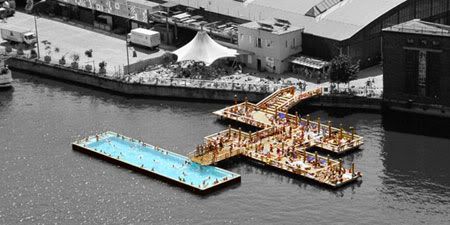

0 comments:
Post a Comment